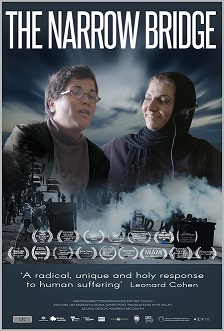
THE NARROW BRIDGE
Australia, 2022, 76 minutes, Colour.
Rami Elhanan, Bassam Aramin, Bushra Awad, Meytal Oferl.
Directed by Esther Takac.
There is always an important place for strong documentaries like this. And, currently, an important place for this strong documentary.
This is a film about Palestinians and Israelis. It shows the impact of the aftermath of the establishing of the state of Israel as well as what the Palestinians call Nakba, the catastrophe. 75 years. Will there ever be peace between Israelis and Palestinians? Can there be peace? This film is optimistic.
The film opens with a concert gathering on Israel’s Memorial Day, memories, minute’s silence for fallen soldiers. However, this concert gathers together people from both sides. And, alarmingly, as they gather in peace, there are rabid protests, demonstrators viciously branding the concertgoers as traitors, lefties.
With this opening, demonstration of conflict, the film then moves on to introducing audiences to 4 people, two men, two women, two Palestinians, two Israelis. Each of the four has suffered from the violence, from the hatred, a close member of their family, even two little girls, killed because of the conflict.
This film is a labour of love as well as a labour of peace-seeking by writer-director, Esther Takac. And she constructs this documentary very skilfully. The four central characters, personalities in their own way, are introduced very gradually, seeing them in their day-by day context, family life, speaking frankly to the interviewer. The important thing is that we are invited to share their pain. And, as they give their backgrounds, Rami the son of concentration camp victims, Bassam, militant Palestinian serving seven years in jail when he was younger, Bushra raising her family in Palestine, her son killed in the uprisings, the younger Meytal and her father murdered by Palestinian terrorists.
We get to know these four quite personally within a short space of time. We are being led to discover what they have in common. And that is membership of a community of Bereaved Families, a meeting place for both sides. With meeting, dialogue, expressions of the bitterness of pain, the realisation that each of these parents and children share the same kind of pain, enabling them to listen to one another, to feel support, to discover friendship.
There is a motto shown throughout the film that it will not happen until we talk. And the talk has to take each side beyond reactions of retaliation, unending retaliation.
The meetings, the talking, even through translators, the bonding, shared experiences despite much local hostility, the meetings of the Bereaved are encouraging.
In fact, the impact on these four is so strong and we, the audience, discover to our surprise that they become international representatives of the Bereaved, travelling to the United States and speaking, travelling to a range of countries, Palestinian and Israeli standing on the one platform, demonstrating that shared pain can lead to shared peace.
The running time of this film is quite brief – but it shows, as did the Truth and Reconciliation Commission in South Africa after Apartheid, means that peace is possible, transcending revenge is possible. But, as we look at news reports from Israel and Palestine, we wonder how long this will take. The path to peace is on a narrow bridge.